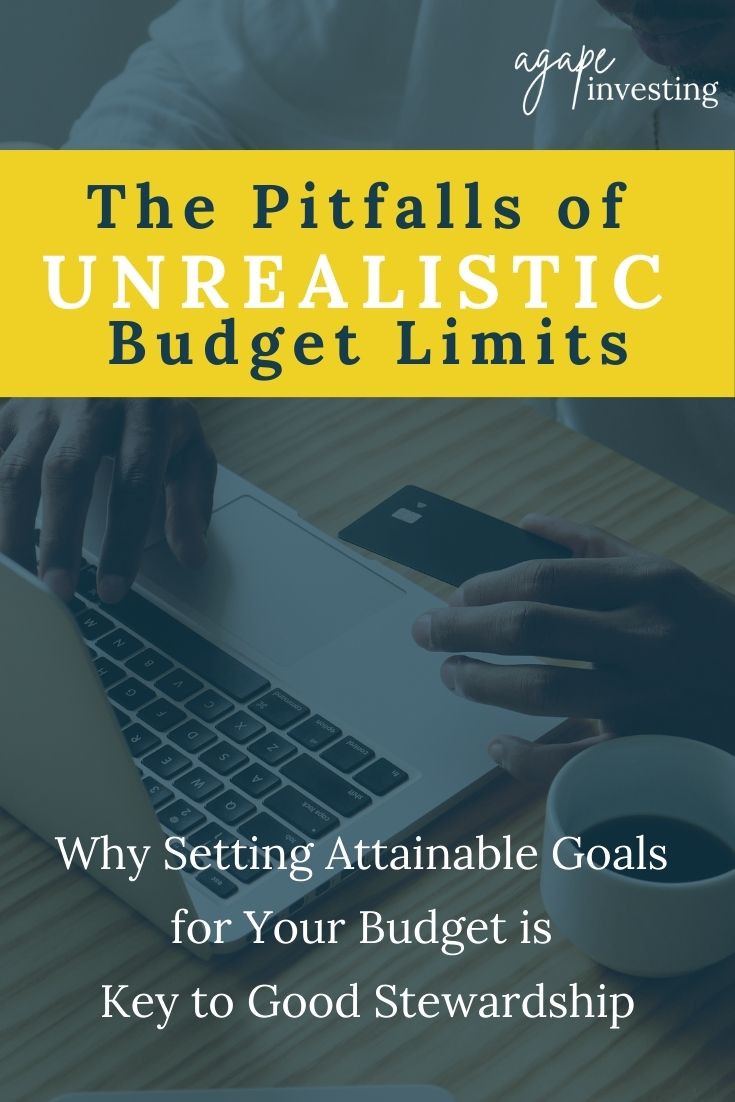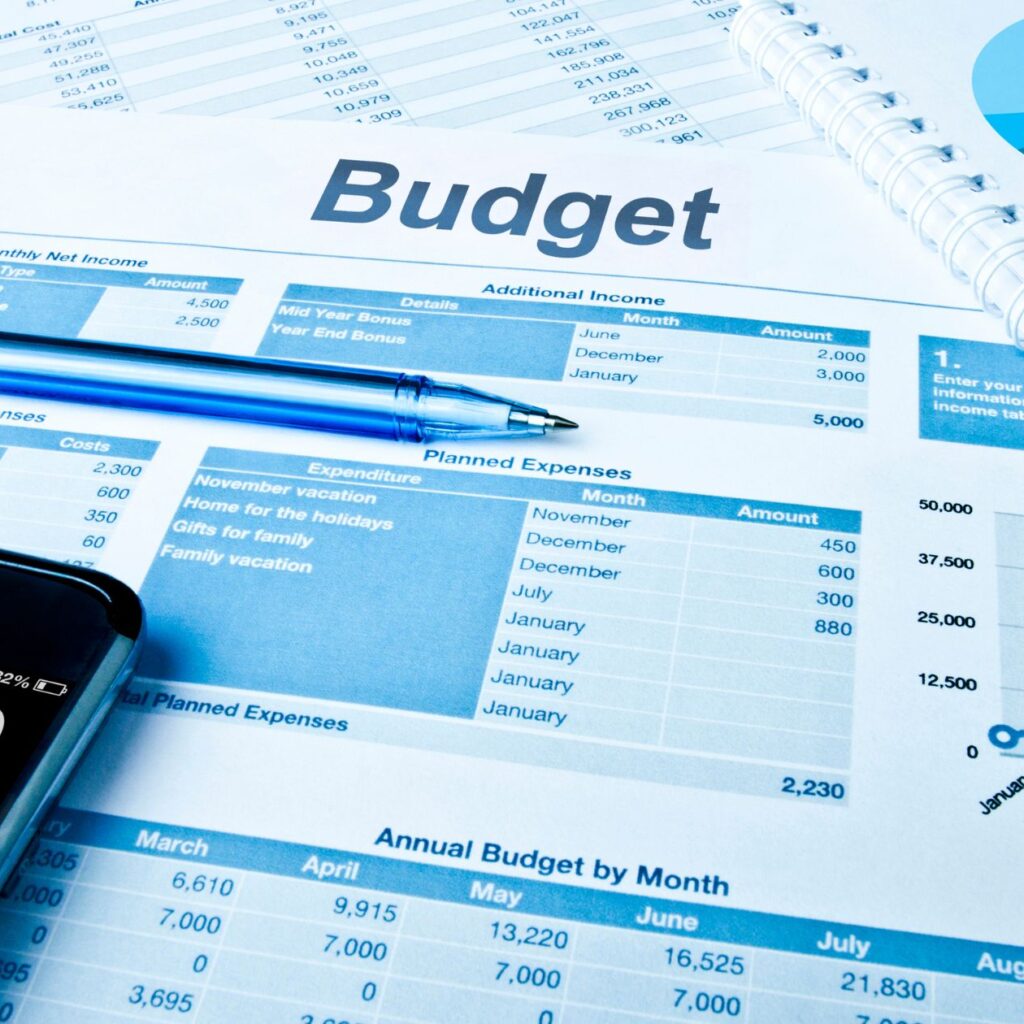The 6 Pitfalls of Unrealistic Budget Limits: Why Setting Attainable Goals for Your Budget is Key to Good Stewardship
Have you ever Googled “How much should I spend on groceries?” Well if you did, you probably came across a plethora of blog posts and financial articles giving you estimated amounts for how much you should be spending. Maybe you even came across a calculator or two like this one on Mint.com to help you come up with a good budget amount.
While it might be helpful to know what the average young adult spends on groceries and other budget categories, it can be really harmful to use those amounts as a hard and fast rule for how much you should be spending. Why? Because there is no one-size-fits-all when it comes to personal finances.
Each of us was created differently with different needs, likes/dislikes, passions, and callings. How each of us spends money will be different and we need to be wise to discern how to spend the money God has entrusted to us.
Not only that but creating unrealistic budget limits on your personal budget can lead to several negative consequences. Here are some reasons why it can be considered a huge financial mistake. There are 6 primary pitfalls of unrealistic budget limits.

The 6 Pitfalls of Unrealistic Budget Limits
Unattainable goals
Setting unrealistic budget limits means you’re establishing financial goals that are beyond your means. This can create frustration and a sense of failure when you repeatedly fall short of meeting those targets. It’s essential to set achievable goals that align with your income and expenses.
Increased stress
Struggling to meet unrealistic budget limits can cause significant stress and anxiety. Financial pressure can negatively impact your overall well-being and quality of life. It’s important to maintain a balanced approach to budgeting that considers your financial capabilities and allows for some flexibility. Plus, God never said we had to cut everything out of our budget that we enjoy. He does desire for us to find enjoyment from the fruits of our labor.
So I concluded there is nothing better than to be happy and enjoy ourselves as long as we can. And people should eat and drink and enjoy the fruits of their labor, for these are gifts from God.
Ecclesiastes 3:12-13
Discouragement and abandonment
When faced with consistently unattainable budget limits that are impossible to meet month over month, you may become discouraged and eventually abandon budgeting altogether. This can be detrimental to your financial health as budgeting plays a crucial role in managing expenses, saving money, and achieving long-term financial goals. Budgeting/planning is one of the primary pillars of Biblical money management.
Impulsive spending and debt
If you restrict your budget too tightly, it may lead to feelings of deprivation, which can result in impulsive spending. I know this because this is exactly what happened to me when I tried to cut out most forms of entertainment from my life that cost money. Over time, this can contribute to a cycle of overspending, accumulating debt, and financial instability. A realistic budget allows for occasional indulgences and discretionary spending while still prioritizing your unique calling from God and your financial responsibilities.
Overspending and debt are things that not only can crush your financial future, they are also things that go against God’s design for your finances. Learn more about what the Bible says about debt here.
Inaccurate financial planning
Unrealistic budget limits can distort your perception of your financial situation. If you consistently underestimate your expenses or overestimate your income, you may fail to allocate enough funds for essential needs or savings. This can lead to financial shortfalls and difficulties in managing unexpected expenses.
You may be tempted to use the money that your budget is saying you will have left over at the end of the month to go buy some new clothes. In reality, you may have actually needed that money for more home supplies. This could also end up leading you to put expenses on your credit card that you should have been able to pay in cash.
Lack of adaptability
Life is dynamic, and unexpected circumstances can arise at any time. If your budget limits are inflexible and unrealistic, you may struggle to adjust and adapt when faced with changes such as job loss, medical emergencies, or other financial challenges. A realistic budget allows room for contingencies and provides a safety net for unforeseen events.
In addition, it is wise to have an emergency fund when major life events happen. Setting aside that money will help you avoid debt and financial stress.
In summary, creating unrealistic budget limits can have detrimental effects on your financial well-being, causing stress, discouragement, and financial instability. It is crucial to establish a budget that aligns with your income, considers your expenses, and allows for flexibility to adapt to changing circumstances.
How to Create Realistic Budget Goals
Setting realistic goal amounts for each of your budget categories is obviously very important for long-term success with your finances. So how do you actually go about setting goals that are attainable and realistic?
Before ever getting started with your budget, it is crucial to track where your money has been going for the last several months. That way, you can get an accurate depiction of how much you spend on average on each of your budget categories.
You can do this by inputting all of your expenses into a spreadsheet and getting the averages.
Not great at spreadsheets? Check out the money-tracking spreadsheets I use with my coaching clients to help them track their expenses for the last several months.
There is a difference between simply tracking your money and budgeting it. With money tracking, you are looking back to see where your money has all gone. On the other hand, your budget should be a plan to help you discern where your money should go before it has been spent.
Once you figure out what you have been doing with your money and how much you spend on each budget category on average, you can then give yourself more realistic budget goals.
For example, if you have been spending $600 on average on groceries, it would be unrealistic to say you are all of a sudden going to only spend $300 on groceries each month. That is reducing your average spending by 50% which is extremely dramatic! Instead, set a goal of $650 or $500 and adjust from there. This will allow you the opportunity to be more successful with your budget and build more confidence in your financial system.
Ready to transform your financial journey through faith-based guidance? Book an empowering call with Katie Jones, a Certified Christian Financial Counselor, today and pave the way for abundance and blessings in your life!



